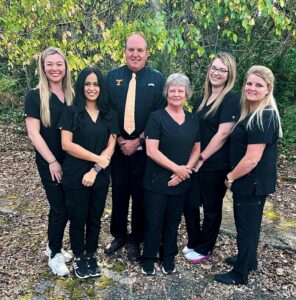
01 May How the Dentist Can Help With Your Dentures
Maybe you thought that once you got dentures, your days of going to the dentist would be in the past. No more scheduling appointments. No more waiting. And no more sitting through cleanings and having to have your teeth flossed for you—you’re free. You can just pop your dentures in and go on your way. Right?
It would be nice if things were that simple. The truth is that dentures require upkeep just like natural teeth do, simply in different ways. One aspect remains the whether your teeth are natural or prosthetic. That is the importance of visiting the teeth professionals—yes, we mean the dentist. In case you were wondering why that’s still important once you have dentures, we’ll review the top five benefits. Dentists improve your experience with dentures and your overall health by:
1 – Providing Professional Denture Cleanings
Did you know that plaque can stick to dentures just like it sticks to natural teeth? It’s true. And when plaque builds up, you know what it becomes—tartar. No one wants to develop tartar. Only a dentist can remove that. It’s important to scrub away the plaque on dentures so it doesn’t interfere with their fit and function.
If you have some natural teeth left and only wear partial dentures, this cleaning is even more vital. Teeth that share space with dentures are at increased risk of decay. A regular visit allows the dentist to professionally clean any teeth you have, false or otherwise. This is a crucial part of oral health.
2 – Issuing Individual Denture Care Instructions
As Bayport Dental Care explains, at dental visits, dentists can “demonstrate proper cleaning techniques, recommend appropriate cleaning products, and address the patient’s concerns or questions. Effective denture oral hygiene practices help to prevent oral infections, maintain oral health, and extend denture life.” If you’re confused at all about how to handle your dentures, a real appointment is the best and most direct way to address your concerns. You could also be handling your dentures incorrectly without even realizing it, risking discomfort for you or damage to them! Checkups are the perfect way to check in and let the dentist let you know if you need to be doing anything differently.
3 – Slowing Bone Resorption
Have you ever heard of “turkey neck?” That sagging skin is a result of bone resorption. If bone resorption isn’t a term you’re familiar with, you’ll likely become familiar with it the longer you have dentures. This process is common to those who wear prosthetic teeth. As one dentist explains: “After your teeth are removed, the bone that used to support them is considered surplus material by your body, which removes the bone and uses the nutrients elsewhere. As this process occurs, denture wearers notice changes in how their dentures fit and function.”
The process goes in stages: first, the body notices that the jawbone is no longer being stimulated by teeth and begins to alter the bone’s shape. Next, your body will go for the bony ridge which was previously holding up your teeth (and your dentures). When that’s gone, the dentures will be held up by the basal ridge. When even that’s too shrunken to support removable dentures, the only option remaining will be dental implants. While dentists cannot ultimately stop the process of bone resorption, they can work with you to identify possible causes and suggest solutions for slowing it down.
4 – Improving Overall Dentures Comfort and Function
If the dentures that once fit you just fine are now irritating to you, don’t be alarmed. That is normal. As Lifetime Dental explains, “Over time, the hard and soft tissues in the mouth tend to change. These shifts can change your bite and throw off the fit of your dentures, resulting in discomfort and an increased risk of health issues like gum disease, sores, TMJ, sleep apnea, and even poor nutrition.” If this happens to you, it’s a sure sign it’s time for a checkup.
What you want to avoid is the temptation to try and adjust your dentures yourself to stop them from irritating you. It may seem like a few quick pushes or pulls would get them to stop bothering you, but dentures are delicate. Likely, all that it would get you is broken dentures. Instead of trying to fix irritating dentures yourself, visit the dentist.
There are different solutions dentists can perform to fix ill-fitting dentures: they are usually called a hard reline and a soft reline. If you have a soft reline, it should last you about 1-2 years before it’s time to visit the dentist for them to do it again. If you have a hard reline, it should last at least two years. Either way, it’s important to get them relined in a timely manner for the sake of their function and your own comfort.
5 – Extending Dentures Life
Dentures that are clean and well cared for will last you longer than ones that are dirty, ill-fitting, and not well taken care of. By visiting the dentist while you have them, you receive the benefit not only of a professional cleaning, but also of tailored instructions, relining when necessary, and strategizing against troubles like bone resorption that may arise. Taking good care of your dentures like this will go a long way in extending their life. They usually cost somewhere around $2,000 a pop, so you’re saving yourself a good amount of money down the road! The choice you make to see your dentist today is an investment in your future.
It may seem unnecessary to go see your dentist even though you only have prosthetic teeth. However, as we covered, prosthetic teeth need cleaning just as much as natural teeth do. By taking good care of your dentures now, you reduce the risk that they’ll break on you or simply wear out from too much everyday strain. That’s why it’s important to see the dentist even if nothing’s “wrong.” If you have questions about how best to care for your dentures or would like to schedule your next appointment, please contact our office today.

About Our Team
Our team at Bloomingdale Dentistry has over 40 years of experience in the field of dentistry. We have a reputation of excellence in patient treatment and care.
To learn more about our team, visit our team page.
